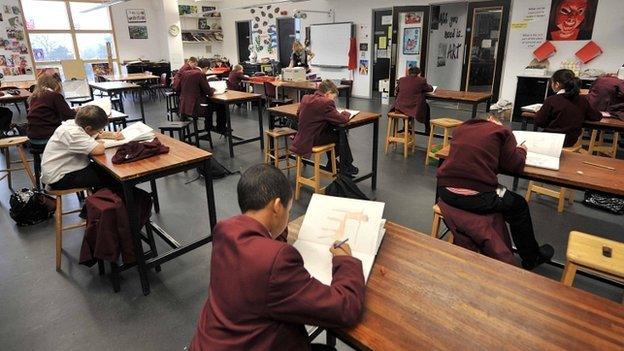Flexible working could help solve teacher shortage, think tank argues
- Published

More teachers should be able to work part-time, urges a report
Schools in England should embrace flexible working to tackle a teacher supply crisis, argues a think tank ahead of a head teachers' conference.
Teacher shortages will be high on the agenda as the Association of School and College Leaders meets this weekend.
Flexible working could bring thousands of teachers back into the profession, argues the Policy Exchange paper.
A government spokesman agreed too many women teachers were leaving the profession.
Schools face a dual threat posed by funding cuts and severe teacher shortages, ASCL's annual conference will hear.
"These problems are so acute that there is a serious danger we will not be able to maintain current standards, let alone raise them further," union president Alan Foulds will warn in a speech.
The report, written in conjunction with ASCL, explores teacher recruitment and supply in a series of essays.
Policy Exchange's head of education, Jonathan Simons, points out that of 45,000 to 50,000 teachers joining the state sector each year, "around a third are actually returners".
Mr Simons says official figures suggest more than a quarter of the teachers of working age who left the profession between 2008 and 2012 were women aged 30 to 39 - some 6,000 a year.
"The most obvious conclusion to be drawn here is that this is maternity related," writes Mr Simons.
Of those who quit the labour force completely, perhaps to look after family, only about half return to the classroom, he points out.
Not just part-time
Mr Simons says the answer, both to attracting mothers back into classrooms and to the issue of burnout for both male and female teachers, could be flexible working in the form of part-time work or managing timetables to fit in with caring responsibilities.
"Schools and the government both need to recognise the need for flexibility, and that flexible working means more than just working part-time," he said.
"In particular, we know that younger graduates tend to want portfolio careers which enable them to come in and out of professions, and teaching is no different.
"Our education system needs to embrace a new way of working.
"If it doesn't, schools are going to continue to struggle to attract and retain the best talent."
An ASCL spokeswoman called the suggestion "eminently sensible".
Flexible working could also boost the numbers of women teachers reaching leadership roles - currently 62% of secondary teachers are female, but only 36% of heads, said the spokeswoman.

Flexible working could find favour with younger graduates seeking portfolio careers, the paper argues
The National Union of Teachers said many teachers were already seeking part-time work in an attempt to balance "unsustainable workload with family responsibilities".
"We need to see real and significant changes to teachers' working lives, both in terms of pay and conditions as well as reducing the punishing accountability system that is overburdening the profession and blighting children and young people's education," said NUT deputy general secretary Kevin Courtney.
In a statement, the Department for Education said the latest figures showed a rise in numbers of former teachers returning to the profession.
"But we know that a lack of flexible options creates a barrier, in particular for women who take career breaks, and we will soon be encouraging further work to support flexible working for female teachers and to encourage women to return to the classroom."
Budget concerns
Lucy Powell, Labour's shadow education secretary said the report was more evidence of an "undoubted" teacher shortage.
"Yet, whilst the Tory government continues to deny there is a problem, they can't come up with a solution... this means growing numbers of pupils are not getting the education they deserve," said Ms Powell.
Separately, a survey of 900 ASCL members in England and Wales, indicated 84% felt funding failed to meet the "essential needs" of their school or college, while 77% said financial pressures were having a detrimental impact on pupils' education.
- Published10 February 2016

- Published6 January 2016
